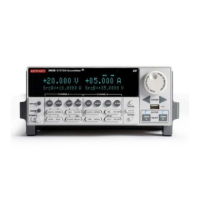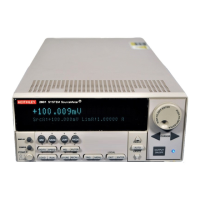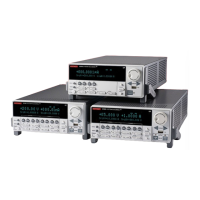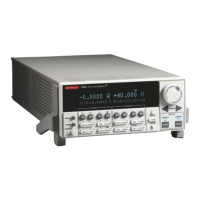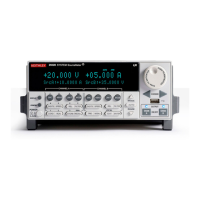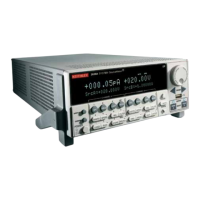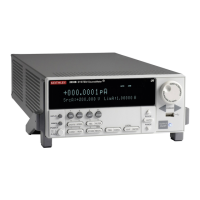5: Introduction to TSP operation Series 2600B System SourceMeter® Instrument
5-20 2600BS-901-01 Rev. C / August 2016
Userstrings
Use the functions in this group to store and retrieve user-defined strings in nonvolatile memory.
These strings are stored as key-value pairs. The key is a unique identifier such as a part number or
identification string.
You can use the userstring functions to store custom, instrument-specific information in the
instrument, such as department number, asset number, or manufacturing plant location.
userstring.add() (on page 7-410)
userstring.catalog() (on page 7-411)
userstring.delete() (on page 7-412)
userstring.get() (on page 7-413)
Factory scripts
Introduction
The Keithley Instruments Series 2600B System SourceMeter
®
instrument is shipped with one or more
factory scripts saved in its flash firmware memory. A factory script is made up of a number of
functions. Some of them can be called from the front-panel LOAD TEST menu. All of them can be
called using remote programming.
As Keithley Instruments develops additional factory scripts, they will be made available on the
Keithley Instruments webite (http://www.tek.com/keithley) as a flash firmware upgrade for the Series
2600B. See Upgrading the firmware (on page A-4) for instructions on upgrading the flash firmware of
your Series 2600B instrument.
A factory script is similar to a user script, except a factory script is created by Keithley Instruments at
the factory and is permanently stored in nonvolatile memory. The differences between a user script
and a factory script include the following:
• A factory script cannot be deleted from nonvolatile memory.
• The script listing for a factory script can be retrieved and modified, but it will then be treated as a
user script. A user script cannot be saved as a factory script.
• Factory scripts are not stored in global variables. The only references to factory scripts are in the
script.factory.scripts attribute.
• The script.factory.catalog() function returns an iterator that can be used in a for loop
to iterate over all the factory scripts.
Example
To retrieve the catalog listing for factory scripts, send:
for name in script.factory.catalog() do print(name) end
Running a factory script
Use either of the following commands to run a factory script:
script.factory.scripts.name()
script.factory.scripts.name.run()
Where: name is the name of the factory script.
